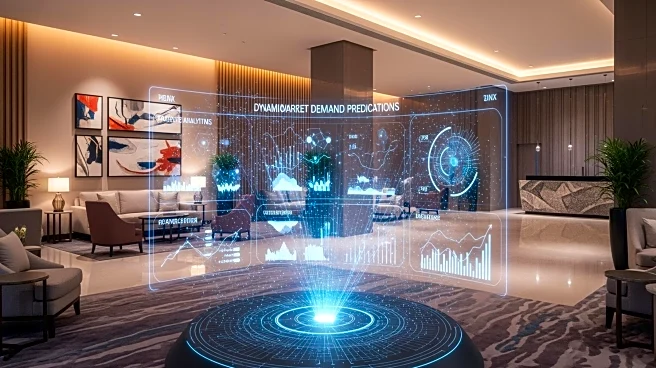What's Happening?
The hospitality industry is shifting from traditional forecasting methods to a hybrid strategy that incorporates real-time, forward-looking search data to predict market demand more accurately. This approach
combines historical performance metrics with external market intelligence, allowing hotels to make informed commercial decisions swiftly. The integration of predictive market intelligence solutions enables hotels to capture real-time guest intent and future booking momentum, providing a first-mover advantage in revenue opportunities. This shift is crucial as relying solely on historical data has proven inadequate in the face of market volatility, such as unexpected events or economic changes.
Why It's Important?
The adoption of hybrid forecasting methods is significant for the hospitality industry as it addresses the limitations of traditional models that rely solely on historical data. By integrating real-time external data, hotels can anticipate market shifts and adjust pricing strategies proactively, enhancing profitability. This approach allows for more precise forecasting, enabling hotels to seize revenue opportunities before competitors. The move towards predictive market intelligence is essential for maintaining competitiveness in a dynamic environment, where rapid changes in demand can occur due to external factors like new events or economic fluctuations.
What's Next?
Hotels are expected to continue integrating forward-looking data into their commercial strategies, leveraging predictive market intelligence solutions to enhance decision-making. This proactive approach will likely lead to more targeted marketing campaigns and optimized pricing strategies, ensuring hotels can capitalize on emerging trends and demand shifts. As the industry adapts to this new standard, the focus will be on refining these tools to provide even greater accuracy and lead time in forecasting, ultimately driving revenue growth and market share.
Beyond the Headlines
The shift to hybrid forecasting in the hospitality industry highlights broader implications for data-driven decision-making across sectors. It underscores the importance of embracing technological advancements to enhance operational efficiency and competitiveness. This transition may also prompt discussions on data privacy and the ethical use of consumer information, as hotels increasingly rely on external data sources to inform their strategies.










